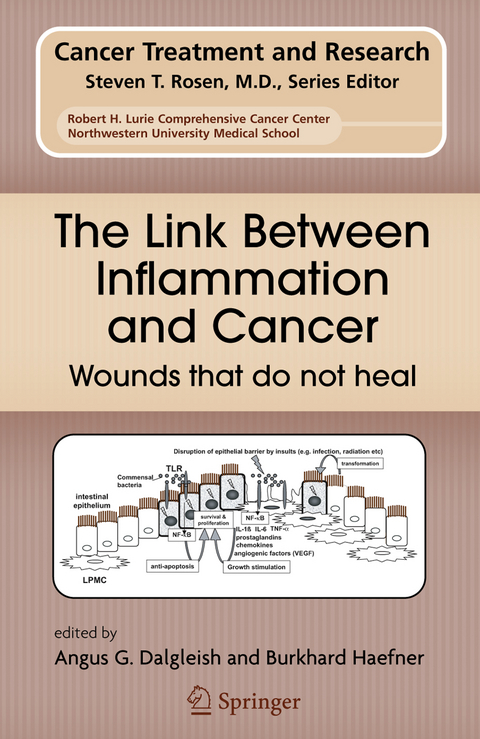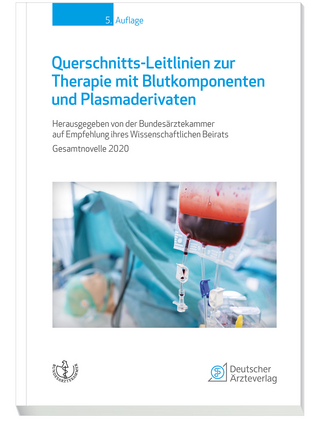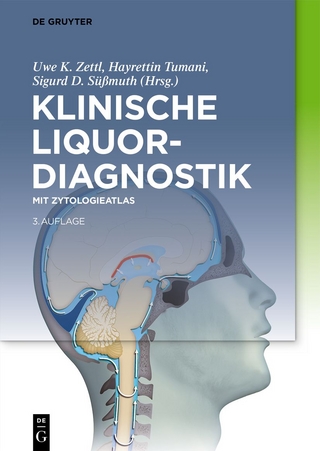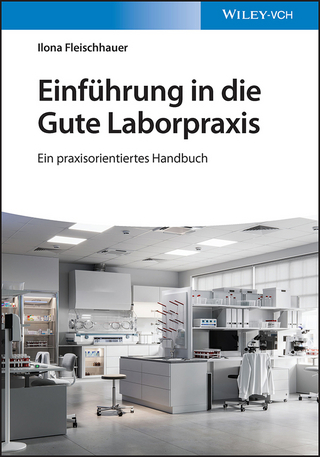
The Link Between Inflammation and Cancer
Wounds that do not heal
Seiten
2005
|
2006 ed.
Springer-Verlag New York Inc.
978-0-387-26282-6 (ISBN)
Springer-Verlag New York Inc.
978-0-387-26282-6 (ISBN)
The transcription factor NF-kB has long been known to play a central role in the immune system by regulating the expression of key genes. There exists a link between inflammation and cancer. This book covers the topic that this link is of crucial importance for the design of novel strategies for cancer treatment.
A link between inflammation and cancer has been established many years ago, yet it is only recently that the potential significance of this connection has become apparent. Although several examples of chronic inflammatory conditions, often induced by persistent irritation and/or infection, developing into cancer have been known for some time, there has been a notable resistance to contemplate the possibility that this association may apply in a causative way to other cancers. Examples for such progression from chronic inflammation to cancer are colon carcinoma developing with increased frequency in patients with ulcerative colitis, and the increased incidence of bladder cancer in patients suffering from chronic Schistosoma infection. Inflammation and cancer have been recognized to be linked in another context for many years, i.e., with regards to pathologies resembling chronic lacerations or 'wounds that do not heal.' More recently, the immunology of wound healing has given us clues as to the mechanistic link between inflammation and cancer, in as much as wounds and chronic inflammation turn off local cell-mediated immune responses and switch on growth factor release as well the growth of new blood vessels - angiogenesis. Both of these are features of most types of tumours, which suggest that tumours may require an immunologically shielded milieu and a growth factor-rich environment.
A link between inflammation and cancer has been established many years ago, yet it is only recently that the potential significance of this connection has become apparent. Although several examples of chronic inflammatory conditions, often induced by persistent irritation and/or infection, developing into cancer have been known for some time, there has been a notable resistance to contemplate the possibility that this association may apply in a causative way to other cancers. Examples for such progression from chronic inflammation to cancer are colon carcinoma developing with increased frequency in patients with ulcerative colitis, and the increased incidence of bladder cancer in patients suffering from chronic Schistosoma infection. Inflammation and cancer have been recognized to be linked in another context for many years, i.e., with regards to pathologies resembling chronic lacerations or 'wounds that do not heal.' More recently, the immunology of wound healing has given us clues as to the mechanistic link between inflammation and cancer, in as much as wounds and chronic inflammation turn off local cell-mediated immune responses and switch on growth factor release as well the growth of new blood vessels - angiogenesis. Both of these are features of most types of tumours, which suggest that tumours may require an immunologically shielded milieu and a growth factor-rich environment.
Inflammation and Cancer.- Chronic Inflammation and Pathogenesis of GI and Pancreatic Cancers.- Cytokines, NF-?B, Microenvironment, Intestinal Inflammation and Cancer.- Regulation if NF-?B Transcriptional Activity.- The Role of Immune Cells in the Tumor Microenvironment.- Tumor-Microenvironment Interactions.- CD95L/FasL and TRAIL in Tumour Surveillance and Cancer Therapy.- Infection & Neoplastic Growth 101.- Cytokines as Mediators and Targets for Cancer Cachexia.- Targeting NF-?B in Anticancer Adjunctive Chemotherapy.
| Reihe/Serie | Cancer Treatment and Research ; 130 |
|---|---|
| Zusatzinfo | XII, 254 p. |
| Verlagsort | New York, NY |
| Sprache | englisch |
| Maße | 155 x 235 mm |
| Themenwelt | Medizin / Pharmazie ► Medizinische Fachgebiete ► Laboratoriumsmedizin |
| Medizin / Pharmazie ► Medizinische Fachgebiete ► Onkologie | |
| ISBN-10 | 0-387-26282-2 / 0387262822 |
| ISBN-13 | 978-0-387-26282-6 / 9780387262826 |
| Zustand | Neuware |
| Haben Sie eine Frage zum Produkt? |
Mehr entdecken
aus dem Bereich
aus dem Bereich
Buch | Softcover (2021)
Deutscher Ärzteverlag
29,99 €
ein praxisorientiertes Handbuch
Buch | Hardcover (2023)
Wiley-VCH Verlag GmbH
49,90 €


